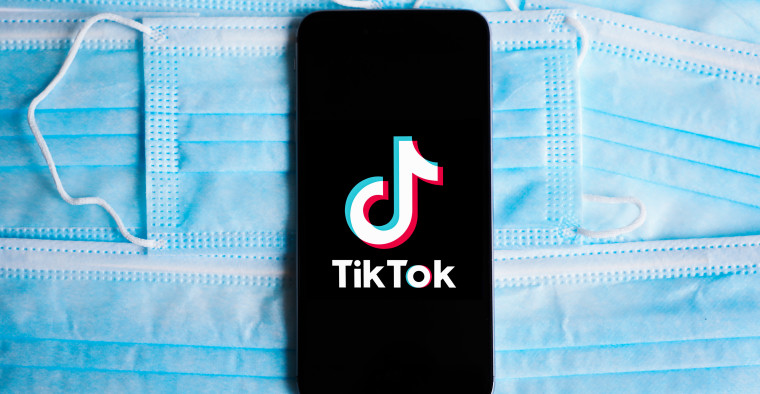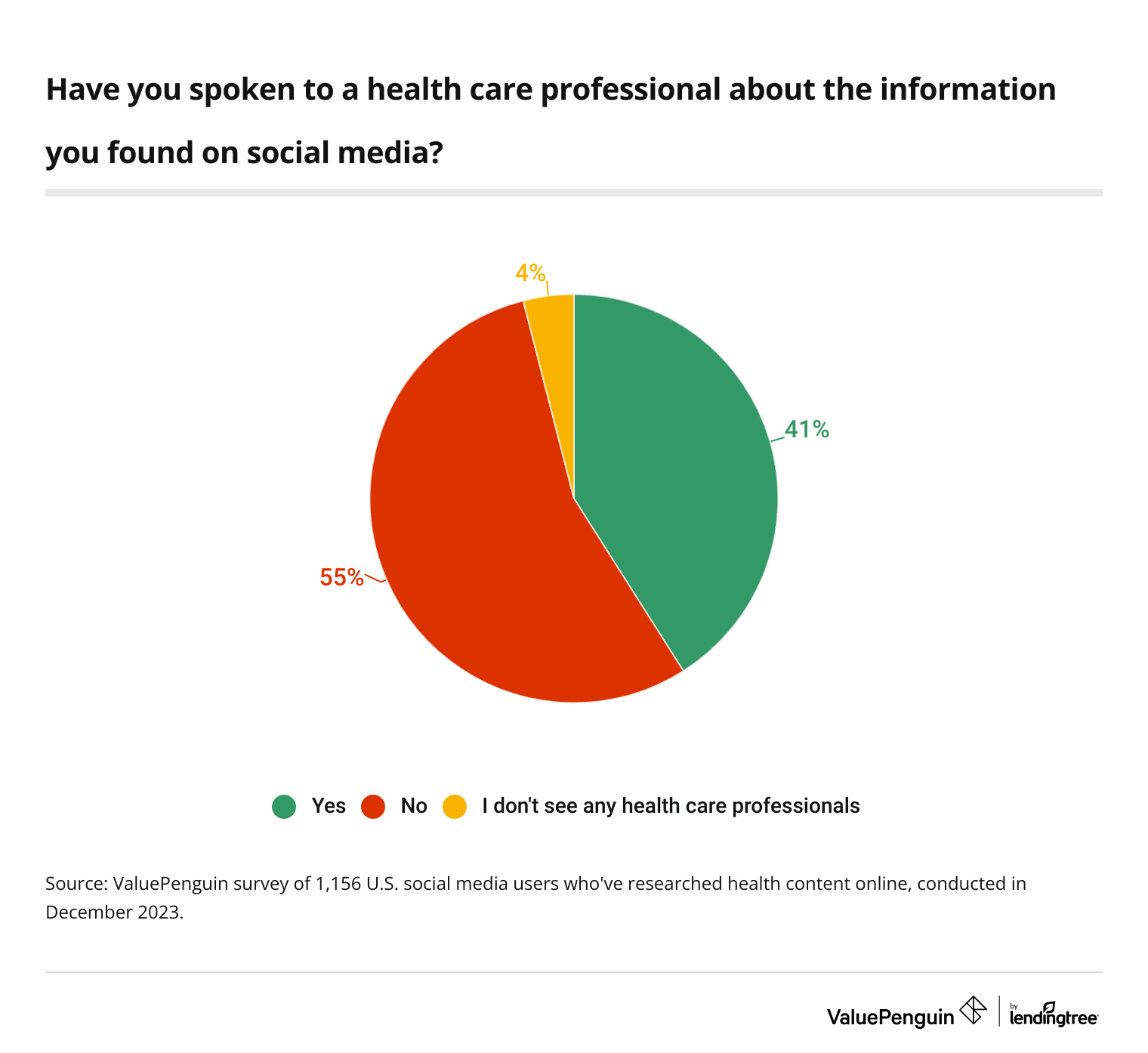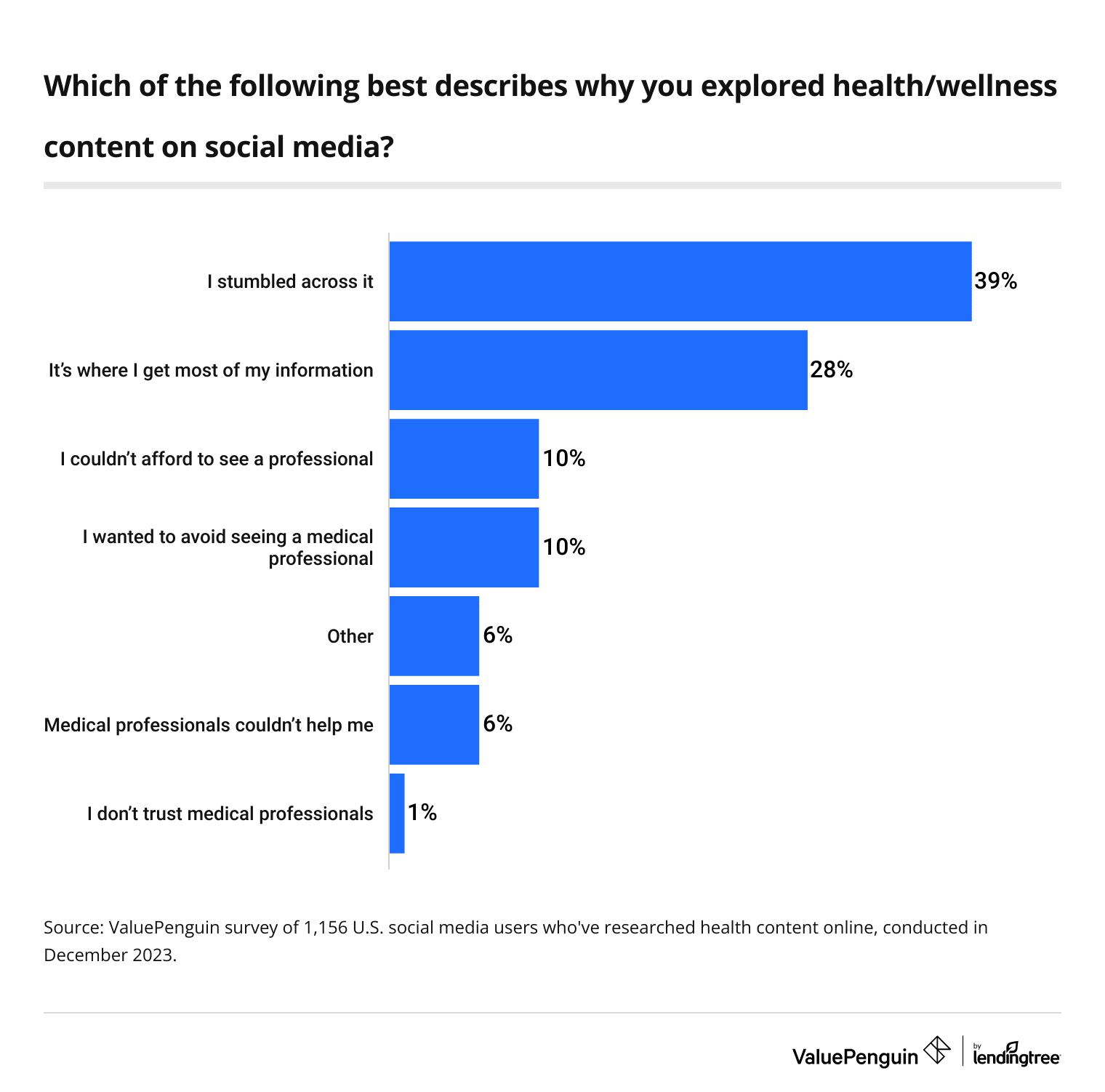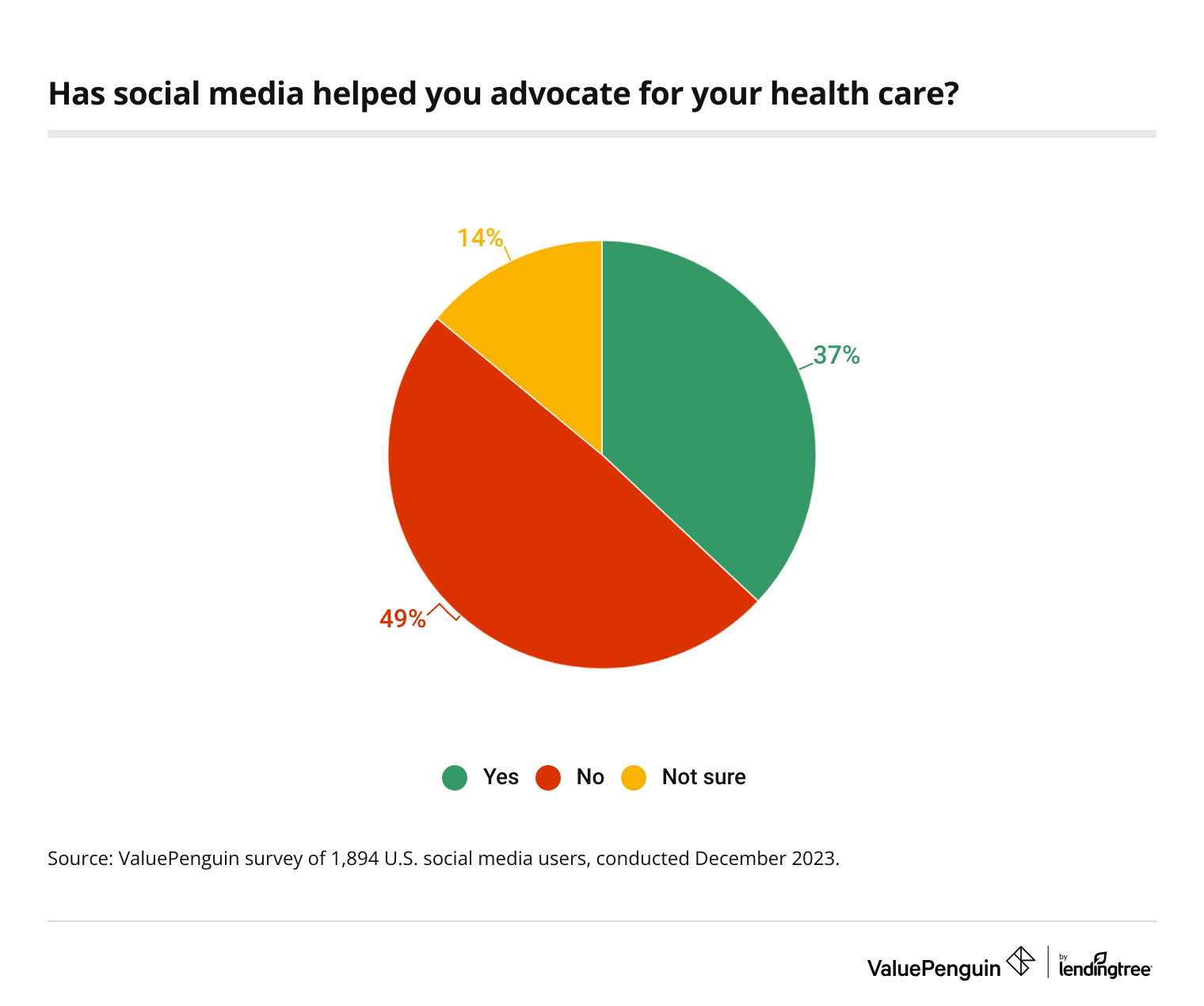Health Insurance
61% of Social Media Users Have Used These Platforms for Health Research — And Many Aren't Checking Creator Credentials

A post a day keeps the doctor away — at least that's what some believe.
According to the latest ValuePenguin survey of nearly 2,000 U.S. consumers, 61% of social media users have researched health or wellness topics on social platforms. And while that's led many to try something new, the majority of those who've researched health or wellness haven't spoken to a medical professional or fact-checked what they've read.
In addition to going over what we've found, stick around for tips on utilizing your health insurance to combat misinformation.
On this page
Key findings
- Many Americans are turning to Dr. TikTok for health advice. 61% of social media users say they've researched health or wellness topics on social platforms, led by 76% of parents with young kids. When asked what they're researching, these social media users most commonly cited weight loss (50%), exercise (48%) and diet and nutrition/link.
- Influencers and their "facts" aren't always checked. Over half (59%) of those who've used social media to research health information haven't spoken to a medical professional about the topic. Additionally, half (50%) of social media users don't check the credentials of the creators providing health-related information. However, younger generations are more likely to look closer: 64% of Gen Zers and 59% of millennials say they've further researched the influencers providing health and wellness content.
- Americans aren't only using social media for research — it also influences behaviors. Roughly half (51%) of social media users say they've seen or read health or wellness content that's influenced their behavior or led them to try something new. Additionally, 36% have passed along social media health-related information to friends or family. When asked for a reason, 28% of those who use social media for health research said they get most of their related info from these platforms.
- Knowledge is power for some. 37% of social media users say these platforms have helped them advocate for their health care, while 62% think health and wellness social media content is helpful. However, 24% distrust online health advice.
Byte-sized wellness: Social media users likely to research health online
The doctor is in … your phone. Among the 95% of Americans who use social media, 61% say they've researched health or wellness topics on these platforms. That's especially true for parents with young kids (76%). Comparatively, 57% of those without kids and 50% of those with kids older than 18 say similarly.
Younger social media users are more likely to research health or wellness online than older users, led by Gen Zers ages 18 to 26 (72%). That's followed by:
- Millennials ages 27 to 42 (69%)
- Gen Xers ages 43 to 58 (56%)
- Baby boomers ages 59 to 77 (46%)
Additionally, women (63%) are slightly more likely to say similarly than men (60%).
While social media can potentially broadcast public health messaging, ValuePenguin health insurance expert Divya Sangameshwar says it isn’t always trustworthy.
"The dark side of social media health advice is the rampant misinformation," she says. "A lot of the advice comes with no guarantee of validity, the advice isn't properly moderated or fact-checked, and many health care influencers are nonexperts who may use the platform to sell their own unproven or counterfeit supplements or medication."
Additionally, Sangameshwar warns that social media users who rely on apps for medical advice could also see their mental health impacted by constant symptom-checking or misdiagnosing. They may even face significant financial consequences from paying out of pocket for unproven medications or supplements recommended by influencers.
When asked what they're researching, 50% of those who've used social media for health research cited weight loss — the most common response. Other responses were:
- Exercise (48%)
- Diet and nutrition (48%)
- General wellness (45%)
- Mental health (44%)
- Sexual health (23%)
- Skin care (23%)
- Women's health (19%)
- Diseases or illnesses (17%)
- Pain management (16%)
- Men's health (16%)
- Injuries (10%)
- Substance abuse (10%)
- Alternative medicine (9%)
- Children's health (8%)
- Specific medical conditions (6%)
Not everyone's actively seeking this type of content, though. Across all social media users, 88% see health and wellness content. About 51% find it to be relevant and interesting, while 38% don't pay attention to it when it comes across their screens.
Health information often goes unchecked
When it comes to the internet, many things shouldn't be taken at face value — including health content. However, not everyone's doing their due diligence: 59% of those who've used social media to research health information haven't spoken to a medical professional about the same topic. That's especially true for baby boomers (65%).

Additionally, women (65%) are significantly more likely to say they didn't discuss the topics they researched with a health professional than men (53%).
"It's very risky to skip the doctor visit and just rely on social media for medical information or diagnoses because of the prevalence of medical misinformation," Sangameshwar says.
For example, a 2023 study by the University of Arizona College of Medicine found that nearly 40% of the information on TikTok surrounding liver disease contained medical misinformation, usually with posts pushing fad diets, detox drinks and herbal remedies that could cause harm.
Going deeper, 50% of social media users don't check the credentials of the creators providing health-related information. Still, tech-savvy younger generations may look closer, with Gen Zers (64%) and millennials (59%) significantly more likely to have researched the influencers providing health and wellness content than Gen Xers (42%) and baby boomers (36%).
With a child's health possibly on the line, it may not be surprising that those with children younger than 18 (63%) are more likely to research health and wellness creators than those without children (48%) and those with adult children (36%). Meanwhile, men (51%) are slightly more likely to do so than women (48%).
By income, six-figure earners (57%) are much more likely to do their research into health and wellness content creators than other earners. For comparison, 47% of those earning between $50,000 and $74,999 or less than $35,000 say similarly — tied for the lowest by income.
Sangameshwar says this is equally as dangerous. "Numerous stories warn about TikTok and Instagram influencers contributing to interest in counterfeit or compounded weight loss medication — compounded medicines aren't Food and Drug Administration-approved but are allowed to be made during an official drug shortage," she says.
In fact, Novo Nordisk, the manufacturer of the popular drug Ozempic, issued a warning about counterfeit formulations of the drug — some of which contain a long-acting form of insulin that can cause an adverse reaction. Poison control centers around the country have been dealing with a sharp increase in Americans experiencing adverse reactions and unintentional overdoses after buying compounded weight loss drugs — whose forms can make it very difficult to calculate the proper dosage.
What can be done to counter this misinformation? "A growing number of health care professionals are leveraging the same social media platforms to make content countering the medical misinformation being put out by influencers," Sangameshwar says. "And some social media platforms have also started to crack down on medical misinformation previously peddled on their sites. YouTube, for example, has repeatedly refined its content standards for videos discussing certain diseases and illnesses and is adding a verified label to videos created by credentialed clinicians."
That being said, only 43% of social media users say they at least somewhat trust the health advice they see on social media, while 39% generally trust the creators they see. Overall, 56% feel confident in their ability to discern accurate health information from misinformation on social media.
Health and wellness content influences users' behaviors
Social media users aren't just researching health and wellness — some are following the advice they see. Among social media users, 51% have seen or read health or wellness content that's influenced their behavior or led them to try something new, with higher percentages for Gen Zers (69%), those with children younger than 18 (68%) and millennials (61%).
And they're not just taking advice for themselves — 36% have passed along social media health-related information to friends or family. That figure's significantly higher for Gen Zers (53%), those with children younger than 18 (50%) and millennials (46%).
When asked why they used social media for health research, 39% of this group said they just stumbled across it, while 28% said they get most of their health and wellness info from these platforms. Alarmingly, 10% explored this type of content because they couldn't afford to see a medical professional, while another 10% said they wanted to avoid seeing one.

Following health and wellness advice doesn't just mean changing your lifestyle — for some, it means a monetary investment. Just over a quarter (26%) of social media users have purchased health products (such as treatments, supplements, subscriptions or services) via a platform. Of this group, 48% spent between $100 and $500 on these products in the past year, while 47% spent less than $100. That leaves 5% who spent more than $500.
Social media may empower some users
It's not all doom, gloom and misinformation — researching health and wellness content has silver linings. For 37% of social media users, these platforms have helped them advocate for their health care. That's especially true for Gen Zers (51%), those with children younger than 18 (49%) and millennials (45%).

Across all social media users, 62% think health and wellness social media content is at least somewhat helpful. That being said, only 43% at least somewhat trust online health advice — leaving just less than a quarter (24%) who feel distrustful of it.
According to Sangameswhar, it's understandable that so many users find social media content helpful — and it can even be beneficial to an extent.
"Social media and Google seem like a natural place to turn for medical information, especially when the user can't afford the cost of a medical appointment or can't find an appointment," she says. "Even with rampant misinformation, social media health advice can be valuable when approached with discernment and a healthy dose of skepticism. While TikTok and other social media platforms can offer knowledge, it should complement — not replace — professional medical care. Talking to trusted medical professionals about what you've found out on social media and seeking their advice and opinions before making any decisions about your health care will minimize your risk."
Clickbait to fit bait: Expert tips on decoding health misinformation
When discerning dangerous claims from useful health information, Sangameswhar says to rely on your health care professionals. And when in doubt, don't be afraid to utilize your health insurance.
"While insurers aren't doing anything explicitly to crack down on medical misinformation, the financial burden of paying out of pocket for a consultation with an uncredentialed 'health expert' or buying a drug from an unverified compounding pharmacy or influencer will continue to be a powerful deterrent," she says. "It'll force their policyholders to seek medical advice from an in-network health care provider and buy their drugs from an in-network pharmacy to get covered by insurance."
If you want to identify misinformation independently, Sangameshwar offers the following advice:
- Ask yourself: Is the source credible? "With countless personalities offering medical advice, it's essential to know how to verify an influencer's credibility," Sangameshwar says. "Licensed health care professionals should prominently display their qualifications and their affiliation with reputable health care organizations. You can also Google the influencer to see if they're legitimate, the type of research they may have published or the reviews they've gotten from their patients."
- Check for accuracy and safety. "If a creator suggests a particular health practice or remedy, take a moment to research it independently," she says. "Reliable medical advice should align with established medical knowledge. If something is too good to be true, it probably is. Be wary of sensationalized or miraculous claims that promise quick fixes or miracle cures — especially if the creator isn't providing any proof of their claims."
- General advice isn't the same as personalized care. "While licensed health care professional creators can offer valuable general health tips, it can't replace the individualized care provided by a health care professional," she says. "The best way to care for your health is to seek guidance from a licensed health care provider who can assess your unique medical history and needs and offer advice tailored to you."
- Want to try a TikTok trend? Proceed with caution. "Social media health challenges often gain popularity, but challenges can involve extreme diets, unproven treatments or dangerous practices — all of which can be extremely risky," she says. "It's important to evaluate the potential risks and consult a health care professional before participating in any health-related challenges."
Methodology
ValuePenguin commissioned QuestionPro to conduct an online survey of 1,991 U.S. consumers ages 18 to 77 from Dec. 11 to 16, 2023. The survey was administered using a nonprobability-based sample, and quotas were used to ensure the sample base represented the overall population. Researchers reviewed all responses for quality control.
We defined generations as the following ages in 2023:
- Generation Z: 18 to 26
- Millennial: 27 to 42
- Generation X: 43 to 58
- Baby boomer: 59 to 77
